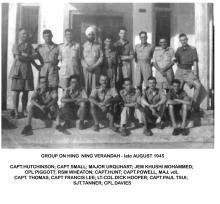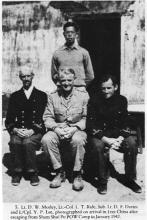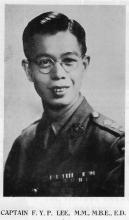Lawrence Tsui writes:
In his book on the BAAG, Edwin Ride devoted a chapter to Francis Lee under his pseudo-nickname "Chicken Lee" (Lee Kai).
In January 1942, Francis Lee stayed on as a PoW at Shamshuipo even when he could have been freed. He made the arrangement and led the escape of Lindsay Ride Party of 3, over the hills of Kowloon to Saikung where they were aided by the Kong Kau Independent Brigade of the Communist Guerrillas to sail from the Three Fathoms Cove to Dapeng Bay; from where they made it overland to frontline town of Wai Chow of Free China.
Lindsay Ride conceived the idea of forming the BAAG in consultation with Francis Lee during the trip. At its nascent formation, Francis Lee returned to Hong Kong to do recce and lay groundwork for the underground operation. He was arrested by the Kempatei, tortured and sentenced to death. He was transferred to Shenzhen where he made good his escape.
Not withstanding that torture & near death plight, Francis Lee returned to occupied-Hong Kong with the recce team led by Ronald Holmes in the summer of 1942. He came down from the Lion Rocks and went to the urban areas in furtherance of his tasks.
In the autunm of 1942, Francis Lee again returned to occupied HK to set up Post Y at Chek Keng, Saikung. Post X at Shayuchung, Dapeng Bay; Post Y at Saikung; and Post Z (Kwong Hang Store at Shamsuipo) formed a special communication line in co-operation with the Kong Kau Guerrillas, between AHQ at Wai Chow and underground operatives in HK. Francis Lee was stationed most of the time at Post Y (relieved periodically by Osler Thomas).
The liaison work with the guerrillas was challenging as it would be under the strong suspicion of both the Communist and Nationalist Government authorities. During his posting at Post Y, Francis Lee made trips to urban Kowloon including meeting agents and taking photographs. Post Y was closed down in July 1943. Post Z in Shamshuipo was raided earlier by the Kempatei along with the demise of Group B which establshed initial contact with Shamshuipo Camp and the Indians at Ma Tau Chung Camp.
In October 1944, Francis Lee led a Recce Team to set up an Observation Post for enemy shipping at Koling in Dapeng Penninsular. Operation 'FRIGATE BIRD' did not materialise because the team was captured by the local Communist Guerrillas and held hostage at Tung Peng Chau until December when a ransom was paid after negotiation by Ronald Holmes.
Apart from the MM, the courageous, resourceful and very dedicated Francis Lee was also awarded the MBE (military division) and received his commission during the War. He was a founding member of the BAAG. However, the Francis Lee I knew as a kid was a meek & mild man whom we called, somehow but rather deservedly, 'Uncle Lion'. He passed away in the early 1960s with a young family who are now living in Toronto.



Comments
Francis Lee
Francis Lee Yiu-piu Chinese name - 李耀彪. [Updated: Should be 李耀標, see comments below]
'Thomas Osler' was a typo; he should be Dr. Osler Thomas (譚譪勵).
Francis Lee Yiu Piu
Hello David,
You might like to add the Citation for Lee´s work in the BAAG:
"This officer served during the hostilites in Hongkong as a L/Cpl in rhe HKVDC. After his escape from P/W Camp he was demobilised and served for two years with the BAAG in a civilian capacity. In March 1944 he was commissioned with Force 136 and seconded to duty with th BAAG. Throughout the whole of this period hius service has been consistently noted for both couraage and devotion to duty of the highest order.
A few months after his escape from P/W Camp he returned (as a civilian) to Hongkong on a secret mission, knowing full well that his recognition by the Japanese would mean certain death. Through the treachery of certain Chinese in Hongkong, Lt. Lee was again apprehended by the enemy who fortunately did not recognise him. He was tortured repeatedly in an attempt to force him to confess that he was a Chinese Central Government agent. On his refusal to divulge anything whatsoever concerning himself or his mission, even though he was tortured to the stage of unconscuiousness a number of times, he was sentenced to death. His release was engineered through underground channels and he returned undaunted to his BAAG duties. Not withstanding this experience, some time later he again returned to Hongkong and for 6 months ran an intelligence post with the guerillas in the hills overlooking Kowloon, right in the midst of this strongly held Japanese territory.
In 1943 he was put in charge of a team of six which was to set up a coast watching station on the Taipang Peninsula, an area which was in the hands of Chinese guerillas, though frequently visited by enemy patrols. This operation had the full approval of the Chinese Central Government but the post was captured by the Red guerillas and all the personnel held prisoner for three months. During this further period of captivity Lt. Lee’s conduct was as courageous as ever; as before, he resolutely refused all but the reasonable demands of his captors and there is no doubt that it was due largely to his conduct and leadership that the lives of his men were spared and that they were eventually liberated.
In the autumn of 1944 (now as an officer) his magnificent record was further enhanced by the services he rendered with the BAAG demolition team which stayed behind to help stem the enemy advance on Kweilin. In January 1945 he was in charge of the administration of the advance party which flew over to Eastern Kwangtung to set up BAAG HQs behind the enemy lines; there he remained till the Japanese surrender when he moved to Canton with Admiral Sir Chan Chak’s party which took over the administration of Canton.
Throughout this period of nearly 4 years the record of this officer has consistently been one of utmost devotion to duty; when subjected to indescribable tortures by the inhuman Japanese gendarmes, his courage remained unflinching, his loyalty never flagged; in the forward areas he repeatedly displayed complete indifference to his own safety, the success of the operation being his one and only aim. The remarkable example of competence, devotion to duty and loyalty of this young Chinese not only won for him the highest admiration and respect of his British fellow officers but was an inspiration to his fellow countrymen with whom we had to work so closely, a factor which was largely responsible for the measure of confidence, good-will and co-ordination between the officers and staff on which the success of our work entirely depended.”
(signed) L.T Ride, Colonel, 1945.
re: Francis Lee Yiu Piu
Thanks Elizabeth,
Mr Lee was certainly a very brave man.
These citations give a good summary of the person's work with the BAAG. If you have any other you can add, they will be very welcome.
Regards, David
Francis Lee Yiu Piu
Brigadier Sir Lindsay Ride, Honorary Colonel Hongkong Regimant, 1967:
"It is an amazing thing that in spite of our close association together for so many years, I can find no records that enable me to fix the exact date of our first meeting, but it must have been some time in 1936 that he came to work with me in the Department of Physiology in the University of Hong Kong. He had already been for some years a very active member of a Kowloon troop of Boy Scouts and latterly had also joined the St. John Ambulance Brigade, but with the willingness and thoroughness that I was soon to learn were amongst the invaluable characteristics of Lee, he threw himself into his work in the University with such zest that he soon became the king pin around which the whole of the department’s basic functions revolved.
At that time in the H.K.V.D.C. the forward planning included the development of the Medical Section into a Field Ambulance, and Lee voluntarily took over much of the clerical work in which I was involved; here as in his University work, he soon became an integral part of the work and it was only a matter of time before it became, obviously to the advantage of all concerned, for him to transfer from St. John Ambulance Brigade to the H.K.V.D.C. This was done in 1937.
The years immediately preceeding the war were hectic ones in the Colony generally and the H.K.V.D.C. was certainly no exception. On the medical side it had to organize a Field Ambulance which could provide for the evacuation to hospitals of all military casualties wherever they happened to occur throughout the Colony and this meant organizing a recruiting programme as well as stepping up and intensifying the existing training programmes. After the outbreak of war in Europe, when I assumed the paper command of the Colony Field Ambulance in addition to that of the H.K.V.D.C., this meant a large increase in work in the office as well as with the unit. Much of this was borne by Lee but his health, which had never been very robust, could not stand this extra strain and in 1941 he was given sick leave from the Corps for hospital treatment. This entailed a long convalescence and he was just beginning to be his normal self again when the international situation here worsened. Early in December 1941 he discharged himself (against medical advice) from hospital and reported back to the H.K.V.D.C. from leave; I don’t mind admitting I aided and abetted his turning a deaf ear to this medical advice because I knew his convalescence would be wasted if he was not at his post when and if the call to war came. I fondly thought I could prevent him from doing more work than he should do, but I did not know then the real character of the man I was dealing with. On the 7th December Cpl. Lee was mobilized for full active service with his unit!
When we met in Sham Shui Po camp as prisoners-of-war, we immediately began to plan our escape and it was the difficulties we encountered in the New Territories which provided the first proof of his real character. His dependability and his resourcefulness in tight corners, but cheerfulness in adversity, his youthful happiness when good fortune smiled on us were aspects of his character which hourly became more and more apparent to me and led me to decide that although I was nominally in command of the party, when it came to dealings with Chinese guerillas or villagers, Lee’s decisions were to be final and binding. I never once had any cause to regret that step; on the contrary I was ever grateful to him for this lesson because from then on I had the ready answer to those who argued that Chinese would never accept the responsibility of authority as far as foreigners were concerned.
During the long and dreary days and nights on the East River craft between Waichow and Lolung, Lee and I spent many an hour discussing the possibilities of operations in Kowloon and the New Territories, and the scheme I later suggested to the British Military Attache in Chungking which resulted in the formation of the B.A.A.G. was based to no small extent on these encouraging discussions I had with Lee. That his initial show of bravery and resourcefulness was no mere flash in the pan was proved by his early record with the B.A.A.G. when he came back some months later on a mission into enemy occupied Hong Kong and once again became a Prisoner of the Japanese. Fortunately they had no idea of his real identity and although he was this time sentenced to death, he was again able to make good his escape, this time from a prison near Shum Chun. With such a record, no one could possibly fail to agree that his award of the Military Medal in 1942 was richly deserved. But for this devotion to duty he paid a very heavy price; it is not beyond the realms of possibility that the torture to which he was subjected by his captors this time had more than a little to do with his early death; but what is certain is that to be prepared to serve again in enemy territory after this taste of their hospitality, called for a standard of bravery encountered only amongst the bravest of the brave. This was Lee’s standard, and his further service with the B.A.A.G. was just as outstanding as his early service was. He was a member of the group that spent some considerable time in the New Territories during its occupation by the Japanese and Lee was also a member of the demolition team which operated in the face of the Japanese advance in the vicinity of the Kweilin-Liuchow-Patpo triangle after the withdrawal of the American 14th Airforce from their bases in that area.
After the war Lee went to England for some short courses of study, and immediately after his return to Hong Kong he rejoined the Volunteers which had by then been re-formed as the Hong Kong Defence Force. In the Hong Kong Regiment were embodied the principles that had been tested and tried in the B.A.A.G. during the war; briefly they were that no one national group has the monopoly of all the virtues and all the abilities, and for any organization to be a success in this cosmopolitan part of the world, it must be prepared to use the resources of all its constituent national groups, and to use them where they can each serve best, unconfined by bounds imposed by nationality.
When the Recce Unit was formed it was natural that Lee should find his spiritual home there. He had been commissioned in the Defence Force on the 25th May 1949 and promoted Captain on the 1st April 1957, but the thing that gave him the greatest satisfaction was his appointment as O.C. Recce Unit on the 12th December 1957. Unfortunately for us his civilian appointment with the Auxiliary Medical Services in the Colony eventually made it necessary for him to give up his active work with the Volunteers, but his record remained with us - an indelible example; and so when he passed away on the 6th August 1966, we were deprived far too soon of a friend, but not before he had helped to write into the fabric of “The Volunteers” those high principles of Chinese service which he held and practised throughout his life."
The Lee brothers
I think that in connection with this subject, and also that regarding the "Ping Shan Aerodrome," reference should be made to Emma Oxford's excellent book "At Least We Lived."
Emma's book chronicles the life of her father Squadron Leader Max Oxford and his wife Audrey, pre-WW2 in both Hong Kong and Chung King, China, as well as in both post-WW2 Malaya and Hong Kong.
Max was the Deputy (and at times Acting) Director of the Civil Aviation Department of the HK Government; hence the reference to the (proposed) Ping Shan Aerodrome in which he was heavily involved.
Reference is made, in Emma's book, to both of the Lee brothers. To this day the family's connection with Causeway Bay is very strong.
Francis Lee Yiu-piu MBE MM
I realised that I have made a mistake of Francis Lee's name when first posted. It should be 標 not 彪. He was 李耀標. Born 1916-12-23, passed away 1966-8-5. Kindly correct.
As to Tideswell27 's comment 2020-04-30, I think the Lee Brothers referred to were the family of Lee Garden - 利 family, and not Francis Lee family.
R.C. Lee 利銘澤 was for a short time involved with the BAAG at its inception, but quickly faded out of the picture. In fact, he was with Ride when they recruited my father in March 1942. Francis Lee was also with the BAAG before the inception. He, as Chicken Lee, penetrated HK already in secret mission, with dire consequence.
Lawrence
re: Francis Lee Yiu-piu MBE MM
Dates and Chinese name updated.